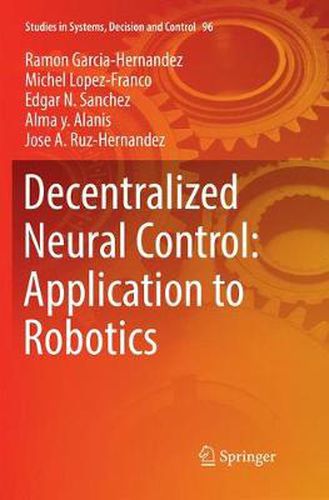Readings Newsletter
Become a Readings Member to make your shopping experience even easier.
Sign in or sign up for free!
You’re not far away from qualifying for FREE standard shipping within Australia
You’ve qualified for FREE standard shipping within Australia
The cart is loading…






This title is printed to order. This book may have been self-published. If so, we cannot guarantee the quality of the content. In the main most books will have gone through the editing process however some may not. We therefore suggest that you be aware of this before ordering this book. If in doubt check either the author or publisher’s details as we are unable to accept any returns unless they are faulty. Please contact us if you have any questions.
This book provides a decentralized approach for the identification and control of robotics systems. It also presents recent research in decentralized neural control and includes applications to robotics. Decentralized control is free from difficulties due to complexity in design, debugging, data gathering and storage requirements, making it preferable for interconnected systems. Furthermore, as opposed to the centralized approach, it can be implemented with parallel processors.
This approach deals with four decentralized control schemes, which are able to identify the robot dynamics. The training of each neural network is performed on-line using an extended Kalman filter (EKF).
The first indirect decentralized control scheme applies the discrete-time block control approach, to formulate a nonlinear sliding manifold.
The second direct decentralized neural control scheme is based on the backstepping technique, approximated by a high order neural network.The third control scheme applies a decentralized neural inverse optimal control for stabilization.
The fourth decentralized neural inverse optimal control is designed for trajectory tracking.
This comprehensive work on decentralized control of robot manipulators and mobile robots is intended for professors, students and professionals wanting to understand and apply advanced knowledge in their field of work.
$9.00 standard shipping within Australia
FREE standard shipping within Australia for orders over $100.00
Express & International shipping calculated at checkout
This title is printed to order. This book may have been self-published. If so, we cannot guarantee the quality of the content. In the main most books will have gone through the editing process however some may not. We therefore suggest that you be aware of this before ordering this book. If in doubt check either the author or publisher’s details as we are unable to accept any returns unless they are faulty. Please contact us if you have any questions.
This book provides a decentralized approach for the identification and control of robotics systems. It also presents recent research in decentralized neural control and includes applications to robotics. Decentralized control is free from difficulties due to complexity in design, debugging, data gathering and storage requirements, making it preferable for interconnected systems. Furthermore, as opposed to the centralized approach, it can be implemented with parallel processors.
This approach deals with four decentralized control schemes, which are able to identify the robot dynamics. The training of each neural network is performed on-line using an extended Kalman filter (EKF).
The first indirect decentralized control scheme applies the discrete-time block control approach, to formulate a nonlinear sliding manifold.
The second direct decentralized neural control scheme is based on the backstepping technique, approximated by a high order neural network.The third control scheme applies a decentralized neural inverse optimal control for stabilization.
The fourth decentralized neural inverse optimal control is designed for trajectory tracking.
This comprehensive work on decentralized control of robot manipulators and mobile robots is intended for professors, students and professionals wanting to understand and apply advanced knowledge in their field of work.